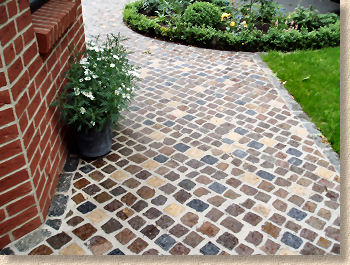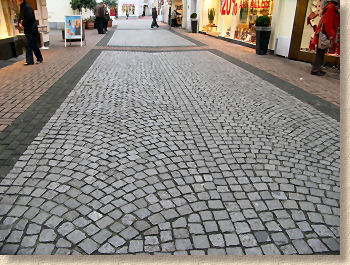Introduction:
While site-mixed cement-based mortars were blotting their copybook over umpteen decades of indifferent performance, those looking for a reliable alternative let their beady gaze fall upon the burgeoning trade in high performance resins, and epoxy-based resins in particular. Here was a product with a proven track record for bonding and durability. By incorporating a suitable filler material, these resins could be the alternative to cement-based mortars that the industry so desperately needed.
Epoxy resins are not particularly cheap. Indeed, compared to a standard site-mixed cement-based mortar, they are frighteningly expensive, roughly ten-to-twenty times the price per kilo, but what you get for your money is performance, and when the cost of ripping-up and replacing a pavement that has failed due to poor quality cement mortar is considered, many engineers and specifiers came to accept that it was a price worth paying.
It should be noted that not all resin-based jointing mortars rely on an epoxy resin. Several lower-strength products use various different chemicals, including polybutadiene, to 'glue together' the filler content (usually a sand). Similarly, the term "epoxy resin" encompasses a relatively wide range of products and there is no one 'standard' material. Different brands use different resins, hardeners and fillers and it would be impossible to document all the variations that are available. Instead, the two more popular types are considered: information on the alternatives should be readily available from the manufacturer/supplier.
Those two more popular types of resin-based mortars are the (semi) dry brush-in (sometimes referred to as a "polymeric" or a "one part resin mortar"), and the slurry grouts which are usually a two-part or two-component resin mortar.
The polymeric brush-in type of product tends to be a lower strength product more suitable for use on patios, lightly-trafficked driveways and low-use pedestrian areas, while the mixed on-site slurry-applied grouts tend to be much stronger and ideally suited to larger driveways, public plazas and anywhere open to vehicular traffic.


Polymerics and slurried resin mortar both have their pros and cons, and different installation techniques, so these are covered on separate pages.
These pages are supplemented by a series of Product Studies looking at different applications and uses for a range of mortars from various leading manufacturers:
- Romex - A range of both polymerics (1-part) and resin slurry (2-part) mortars
- GftK VDW 850 - The refurbishment of an existing sett pavement
- GftK VDW 850 - Update on sett refurbishment project
- GftK VDW 815 - 2-part resin mortar for narrow joints
- GftK VDW 840+ - 1-Part Polymeric used for a residential patio area
- GftK VDW 800 - Permeable 2-part mortar for a sett driveway
- GftK VDW 800 - 2-part slurry mortar for a patio
- Jointex Easy - Wet or Dry 1-part polymeric for patio jointing
Comments:
The best of the resin-based slurry grouts are superb products, offering speedy and sound jointing with minimal effort. The only real downside up to now has been the cost, but as the market has developed, this has now settled at a level that makes this group of products reasonably competitive with the better cement-based proprietary brands.
The polymerics provide cost-effective jointing for patios, and the better ones are suitable for driveway use. The extra cost of the material is more than offset by the time saved during installation. However, there are several polymerics that do not actually bond to the paving; they merely harden within the joint, creating a loose plug of material that will just about prevent fag ends getting in, but can be easily blasted out by a passing power washer, thereby contributing nothing at all to the structural integrity of the pavement.
A good guide to the 'bondability' of a product is the value for minimum adhesive strength, which BS7533:12 suggests it should be not less than 1.5N/mm² but any value above 1 N/mm² would be adequate for light use such as patios and driveways.
Other pointing and jointing pages...
- Introduction
- Terms & definitions
- Pointing Styles
- Spacers for Paving
- Cement Mortars
- - Hand Pointing
- - Pointing Riven Flagstones Using Coloured Mortar: A Case Study
- - Wet Grouting
- - Dry Grouting
- - Slurry Grouting
- - Gun Grouting
- - Poured Grouting
- Resin Mortars
- - Polymerics
- - GftK Polymerics: A Product Study - VDW 840+
- - Romex Polymeric Mortars: A Product Study
- - Jointex Polymeric Mortar: A Product Study
- - Slurries
- - GftK Slurry Mortars: A Product Study - VDW 800 Permeable
- - GftK Slurry Mortars: A Product Study - VDW 850
- Re-jointing paving
- Pitch Jointing
- Loose Fill Jointing
- - Stabilisation
- Alternative Jointing Materials
